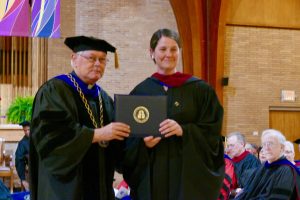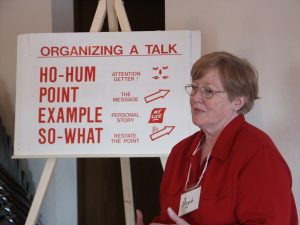Generative Discipleship – Week 21 04
(1 Thes 3:7-13; Ps 90; Rm 12:4-12; Mt 24:42-51)
**************************************************
The theme you chose for this liturgy, “Rooted in Jesus – hearts to love, hands to serve” is a powerful theme that would serve you well for the whole school year.

St Charles Parish in north Edmonton
In the light of this theme and today’s readings, I would like to offer a clear, simple message: Be generative disciples of Jesus through contemplative prayer and selfless service.
The biblical model for your theme is Jesus washing the feet of his disciples. Rooted in the Father’s love, secure in his intimate relationship with the Father, he could take off his outer garments symbolizing power, authority and status, and humbly wash the feet of his disciples – the task of a slave. He then commanded them, and us, to do the same.
We are his disciples today, called to be rooted in him and to wash each other’s feet. There are three stages to discipleship. The first, Essential discipleship, is when we are young and asking questions such as what will we do with our life? The second, Generative discipleship, is the stage we are in now, in which we give our lives away through our gifts and talents that St. Paul mentions in the second reading, to make the world a better place. The third, Radical discipleship, is when illness or an accident or some situation we can’t control means we can no longer do very much and everything is done to us. What is important here is that we can accept some inconvenience or suffering in our lives without bitterness or resentment, as Jesus did. Our suffering becomes redemptive suffering, full of meaning and purpose within the kingdom of God – a truth our society needs more than ever to hear.
As disciples, the first part of your theme, “Rooted in Jesus,” invites us into deeper faith and prayer. In the readings today, the psalm asks God to “Fill us with your love each morning and we will rejoice.” Jesus, in the gospel, reminds us to stay awake, to remain connected. St. Paul in the first reading thanks God for the faith of the Thessalonian and prays their hearts will abound in love.
There is a faith-hope-love pattern in our lives. Faith in God’s love for us, being rooted in Jesus, leads to hope that all will be well. Hope in turn empowers us to truly love.
An Oblate who works with university students observed that young people today lack hope because they don’t have an infinite horizon, a meta-narrative, a bigger faith story into which they can place the events of their lives. All they are left with is whatever happens to them that day – and if their relationship breaks up, they might even end their lives, and some have done that.
The old Baltimore Catechism that our elders grew up with provided a meta-narrative: Why did God make us? To know, love and serve God, so that we might be happy with God in this life and supremely happy with him in the next. Our parents could pray about this life as a valley of tears at times because they had that infinite horizon and knew this life is not all there is. They were like the lady who wanted to be buried with a fork in her hands, because her mother always told her, “Keep your fork – the best is yet to come.” Being rooted in Jesus provides us with a meta-narrative, an infinite horizon.

Mary of Bethany
Being rooted in Jesus also involves prayer. There are many ways to pray, but one of the best ways to stay rooted in Jesus is contemplation. Mary of Bethany is an example – she was not so much listening to what Jesus was saying, as she was aware that she was in the presence of The Word, soaking up his love and that was enough. We have all had that experience in the presence of loved ones without a word needing to be spoken.
Virginia called me one day to complain that she could no longer pray. I knew she had done a 12 Step healing journey, had forgiven her abuser, had taken the Christopher Leadership course, a Marriage Encounter and numerous Search weekends, so I suspected that her problem wasn’t being unable to pray – she was ready for a more mature kind of prayer. I explained Lectio Divina to her, as I believe St. Paul would have done, and she was off and running.
Lectio Divina is an ancient method of prayer that is making a come-back today. There are four basic stages: Lectio or reading – we read a passage of scripture; Meditatio or meditation – thinking about the Word and asking what God is saying to us through that word; Oratio or praying with the word, and finally Contemplatio or contemplation – putting everything aside and allowing God’s love to do whatever God wants to do within us. It is an act of faith, and great for a workaholic as we are not doing anything. If a brilliant thought or strong emotion comes to us, acknowledge it, thank God for it, don’t cling to it, just place it in an imaginary canoe and let it slip away and return to your mantra or phrase from the passage.
St. Mother Theresa of Calcutta always started her day with a Holy Hour of contemplation, and the Eucharist, and taught her sisters to do the same. That is how they stay rooted in Jesus, and where they find the strength to minister to the poorest of the poor. St. Peter, walking back to the boat hanging on to Jesus, is another model for us. He was not about trying it again on his own, nor should we.
“Hearts to love – hands to serve” is the second part of your theme. Love is more than romance or friendship. At its deepest, it is selfless agape, and involves intimacy, forgiveness, trust, vulnerability, and sacrifice.
Jesus, in the gospel, stresses being ready to serve at all times. The Beautiful Hands reflection that was shared with you earlier mentions the many ways that hands can serve. It reminded me of Winston Churchill who said, “We make a living by what we get; we make a life by what we give away.”

Oblate School of Theology in San Antonio, Texas; statue of St Eugene de Mazenod
Lillian Yonkers was president of the Oblate School of Theology when I was taking a sabbatical program in San Antonio, Texas as part of a group of 23 priests and sisters. We were told she would be coming to our closing banquet and so of course we were quite excited. When the time came, we gathered at the banquet table and our director said grace, but there was no sign of her – only an empty chair. Then suddenly she came out of the kitchen with an apron on, and served us for the rest of the evening. The president of the Oblate School of Theology was serving us! We were deeply touched, and realized she was washing our feet in imitation of Jesus.

Lucy Leduc, director of Star of the North Retreat Centre, receiving her degree in Spirituality from the current president, Fr. Ron Rolheiser OMI
I would like to suggest two ways of serving that we can all do, and that is by listening and affirming. People need to be heard, especially children, and people need to be affirmed and blessed, especially children. There is something profound that happens when we are blessed, a shift, some healing and transformation.
Rebecca was a child in Beauval who didn’t talk all through her elementary school years. When she got to high school, she took an English class taught by a parishioner, Angie Mihalicz. Angie was very patient with Rebecca who would silently hang around in the class after school. She listened to her silence with what Archbishop Adam Exner OMI calls “psychic energy” or paying attention. Angie also had the students write their autobiography, and would use what she learned from the Christopher Leadership course to grade their papers: praise, evaluation and more praise. The evaluation was in the sense of “adding value to.” After some months of this, Rebecca slowly began to talk and share with Angie. She took a Search weekend, and later gave a talk at a subsequent weekend on “Opening Up” and finished with the song “Silence and I.” There was not a dry eye in the room as we witnessed a miracle before our eyes – all because a teacher, rooted in Jesus, had a heart to love and hands to serve.

Angie Mihalicz instructing a Christopher Leadership course session
Your theme also reminds me of Fr. Richard Rohr, a Franciscan priest, spiritual writer and sought-after speaker who founded a Centre of Action and Contemplation in New Mexico. Putting action and contemplation together years ago was prophetic. But so is your theme, as you strive to put those two pillars of discipleship into practice during the coming school year – “rooted in Jesus” through contemplation, and action flowing out of that rootedness as “love and caring.”
I want to close with a brief reflection on how children learn what they live, by an anonymous author who could have been a teacher in this school division:
If children live with criticism, they learn to condemn
If they live with hostility, they learn to fight
If they live with ridicule, they learn to be shy
If they live with shame, they learn to feel guilty
If they live with tolerance, they learn to be patient
If they live with encouragement, they learn to have confidence
If they live with praise, they learn to appreciate
If they live with fairness, they learn what justice is
If they live with security, they learn to trust
If they live with approval, they learn to like themselves
If they live with acceptance and friendship,
They learn to find love and God in the world. (Anon)

A girl from Beauval
A painting by the late Fr. Seiger Köder of Jesus washing the feet of Peter and wearing a Jewish prayer shawl links the waters of baptism in the bowl with the bread and wine of the Eucharist on the table above. His message is clear – our baptism and the Eucharist, both sacraments and both liturgies, are to be lived out by washing each other’s feet.
So, as we celebrate the Eucharist today, let us pray that we might be generative disciples rooted in Jesus, expressing our faith and living out the Eucharist throughout this school year with hearts that love and hands that serve.



